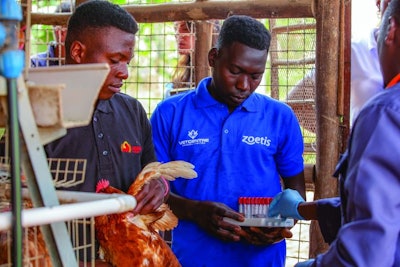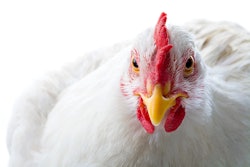
How can you protect flock health if you don’t understand the disease risks that may threaten your farm? If you do know, what do you do if vaccines, let alone treatments, are hard to come by? And if demand for food is rising all around you, then the cost of disease becomes ever greater.
These, among others, are issues that the five-year African Livestock Productivity and Health Advancement (ALPHA) initiative has sought to address.
Organized by animal health company Zoetis, working with local partners in Uganda, Nigeria, Tanzania and Ethiopia, and co-funded by the Bill and Melinda Gates Foundation, ALPHA has notched up an impressive list of achievements, from training vets and treating animals, through to establishing diagnostic laboratories and broad partnerships.
The prevention of disease in poultry has been a key focus of ALPHA. Zoetis has provided a broad portfolio of poultry vaccines, which should help to prevent disease and reduce treatment, including the use of antibiotics.
How the project has developed came under the spotlight in Brussels earlier this year, when Zoetis held an event to look back at what has been achieved and what the impact has been.
Advancing livestock production, incomes
ALPHA has resulted in the registration of 91 veterinary medicines and new pharmaceutical products and has trained 26,000 farmers, veterinarians and paraveterinarians, and through train the trainer programs, over 1.3 million are thought to have been reached.
However, as Glen David, Zoetis president and executive chairman explained, ALPHA’s impact is far deeper than simply product and service provision.
“The ALPHA initiative,” he said, “has enabled us to advance the production of livestock to ensure safe and sustainable food supply, while advancing the livelihoods of local farmers and empowering women in the process.”
Glenn continued that ALPHA had demonstrated that greater access to technology could help farmers to raise healthier animals, secure a more productive and sustainable food supply and improve the prosperity of the countless small farms that make up nearly half of families’ total income in Sub-Saharan Africa.
ALPHA would appear to have been implemented at just the right time. The region in which it has been working has among the highest human population growth rates in the world, while 20% of livestock production is still lost to disease.
Importantly, the project has been working at a level that, to date, has often been overlooked.

According to Food and Agriculture Organization Chief Veterinary Officer Keith Sumpton, to date, primary production has been neglected, with efforts directed towards zoonotic pandemics and transboundary disease.
He continued that, while over the last three decades undernourishment had been dropping, over the last few years, trends had become rather worrying. If sustainable development goals and the elimination of hunger are to be properly addressed, we are not, currently going in the right direction, he said.
Livestock production in Africa needs to be more productive, for a variety of reasons. When people think about livestock production and productivity, they tend to think primarily in terms of food security and alleviating poverty, he continued, but there is a connection between productivity and saving the planet.
To avoid taking additional land for livestock production, productivity must increase, but in Africa it remains low.
Training
ALPHA has fostered training in various ways and, through it, has sought to achieve greater gender equality. This, however, has not always been an easy task, given the cultural challenges in Sub-Saharan Africa.
Mike MacFarland, Zoetis chief medical officer, noted that, to date, 30% of trainees have been women, but that the company’s goal is to raise this to 50%.
To achieve its aims, Zoetis has been working in partnership with both the private and public sectors, including with laboratories, non-governmental organizations, universities and co-operatives, and via digital platforms and specialized portals.
Over the last five years, over 25,000 people have been trained, including over 11,000 farmers. Eighty-one percent of training sessions have been face-to-face, in spite of the challenges posed by COVID-19.
However, there is much more to do. The company wants to see 100,000 farmers, veterinary professionals and laboratory technicians trained by 2025.

What’s being addressed and how
The ALPHA initiative is focused on disease prevention and detection, but treatment cannot be ignored, and, to date, it has resulted in 128 million animals across species being treated. Poultry make up a large percentage of this number and, by 2025, the project should result in the treatment of 200 million chickens and 10 million cattle.
The key to getting products to the farmer has been working with a network of distributors and, as more small farmers join the initiative, its impact is expanding from district to national level.
The initial five-year funding of ALPHA has now come to an end. Zoetis is confident, however, that its work will continue in some from, and its commitment to animal health in the region remains.
How ALPHA will move forward, however, remains unclear, but partnering with Nigerian poultry producer Chi Farms, for example, has not only established an ongoing medicines distribution network, but also founded a training college for poultry management. Chi also has a customer focus team that can train farm owners in areas such as biosecurity and the overuse of veterinary medicines.
Perhaps as importantly as ongoing training will be ongoing knowledge. Famers that have been reached by ALPHA now know, for example, the impact that vaccination can have, while greater availability of diagnostics allows them to view it as simply an incremental cost.
And anecdotal evidence suggests that those farmers that have been reached by ALPHA want to continue working in this new way, whether APHA continues or not, raising their productivity and output, growing incomes and helping to alleviate poverty in the region.

ALPHA key achievements
Sixteen diagnostic laboratories are now fully operational for local veterinarians in ALPHA’s target countries, and over 2,630 professionals, including laboratory personnel, have been trained on diagnostics topics.
In Tanzania, for example, five laboratories were opened last year, and 1,900 professionals have been trained with partners, including the Nelson Mandela University. Over 48,600 chickens have been tested by partner Silverlands Lab.
In Uganda, over 9,450 poultry tests have been conducted in conjunction with Makerere University, and 4,600 farmers have been trained.

ALPHA has led to over 14,300 serum samples being tested at Nigeria’s Veterinary Teaching Hospital and over 246,000 poultry tests being performed in the Chi Farms Laboratory. Five veterinary diagnostic laboratories were set up in the country between 2018 and 2020 and over 11,630 veterinary and farming stakeholders trained.
The initiative has resulted in over 124 million chickens, among other animals, being treated and registration and marketing of 91 veterinary products, but its impact has been far wider.


















